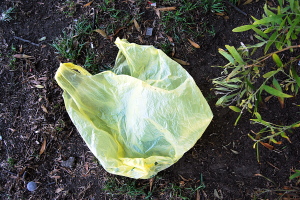 Humans produce 500 billion plastic bags annually.
Humans produce 500 billion plastic bags annually.
In China, they recently banned it. Australia, Bangladesh, Ireland, Italy, South Africa,Taiwan, Mumbai and India have either banned it or discouraged its use by raising taxes. And on March 27, 2007, San Francisco became the first city in the USA to ban it from large grocery stores.
More people are ditching plastic bags on a local and national level with good reason: we produce about 500 billion plastic bags world-wide, and less than one percent of that is recycled.
A recent QUEST report shows that plastic bottles are straining our environment, too: each year the USA alone produces 50 billion plastic bottles. Some would say to switch from plastic to paper bags - but reports show that paper bags aren't the most sustainable solution.
Plastic can have a longer shelf-live than humans do: it can persist in the environment for anywhere between 20 to 1,000 years. But a 16-year-old from Waterloo, Canada figured out to decompose it in only six weeks.
